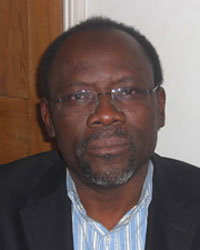 Abdul Raufu Mustapha, a Nigerian Professor of Political Science at Oxford University in the United Kingdom is dead. A whatsapp message from a civil society leader in Abuja who is very close to the late Raufu family has confirmed the death and said the body will be conveyed to Ilorin in central Nigeria for burial tomorrow. There has been no information about whether he was sick.
Abdul Raufu Mustapha, a Nigerian Professor of Political Science at Oxford University in the United Kingdom is dead. A whatsapp message from a civil society leader in Abuja who is very close to the late Raufu family has confirmed the death and said the body will be conveyed to Ilorin in central Nigeria for burial tomorrow. There has been no information about whether he was sick.
Prof Raufu studied Political Science at Ahmadu Bello University, Zaria from where he graduated in the early 1980s. He was among the few of his set of students deliberately sent to foreign academies to specialise in one realm or another, stretching from rural political economy, to West Africa, privatisation and energy. It was the product of the thinking of the industrial segment of the Nigerian ruling elite at that time, particularly the section of the northern elite that was acting in cahoots with Chief Obafemi Awolowo who was Pro-chancellor of the university to pursue the Nigerianisation of the institution.
In Raufu’s case, he specialised in rural political economy at Oxford where he did a Master’s degree and a Doctor of Philosophy. It is trite to say that he did very well as to be recruited as an Oxford academic. Raufu as he is more popularly known can be said to have over published as an academic, if there is anything like that. His list of publications has left nothing out. But the paper that can be said to have shot him to limelight perhaps because of the manner it captured the ideological contestations and tendency bickering about and around the then People’s Redemption Party, (PRP) in the Second Republic and the broad left in Nigeria among the radical academics at that time is “Critical Notes on the National Question: Practical Politics and the People’s Redemption Party”. It was delivered in July 1985.
 In 2011, Raufu along with Adekeye Adebajo, another Nigerian academic based in South Africa edited and published Gulliver’s Troubles: Nigeria’s Foreign Policy After the Cold War. The book was a product of a conference on that title held in 2003 at Queen Elizabeth House at Oxford. At the launching of the book on March 31st at Mambayya House, Department of Political Science in Bayero University, Kano, the late Raufu said, among other things, that no amount of packaging and re-packaging of Nigeria through a branding campaign would solve Nigeria’s image problems because, according to him, “foreign policy is not marketing”. Apparently using the occasion to provide a nuanced response to the fury across Nigeria for its non-invitation to the G-20, Raufu said the decision not to invite Nigeria must be seen as a coded message suggesting the discomfort of the world about how a tremendously endowed country such as Nigeria could be so pedestrian in performance, adding that it shows conclusively that nobody would invite Nigeria to such clubs just on account of its huge population. Foreign policy, he added, is about a country’s ability to be defined by something and to push such interest by forging and mobilising alliances.
In 2011, Raufu along with Adekeye Adebajo, another Nigerian academic based in South Africa edited and published Gulliver’s Troubles: Nigeria’s Foreign Policy After the Cold War. The book was a product of a conference on that title held in 2003 at Queen Elizabeth House at Oxford. At the launching of the book on March 31st at Mambayya House, Department of Political Science in Bayero University, Kano, the late Raufu said, among other things, that no amount of packaging and re-packaging of Nigeria through a branding campaign would solve Nigeria’s image problems because, according to him, “foreign policy is not marketing”. Apparently using the occasion to provide a nuanced response to the fury across Nigeria for its non-invitation to the G-20, Raufu said the decision not to invite Nigeria must be seen as a coded message suggesting the discomfort of the world about how a tremendously endowed country such as Nigeria could be so pedestrian in performance, adding that it shows conclusively that nobody would invite Nigeria to such clubs just on account of its huge population. Foreign policy, he added, is about a country’s ability to be defined by something and to push such interest by forging and mobilising alliances.
May Abdul Raufu Mustapha’s gentle soul rest in peace.


























